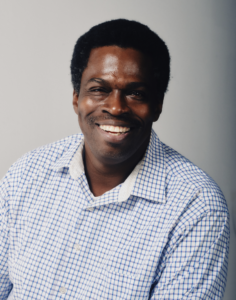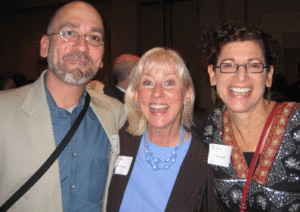
Pastor AJ Johnson (Source: AJ Johnson Social Media profile page)
“Media was critical…Very critical in what we were attempting to do because maybe you told a story that regular average people who don’t live the experience can understand you know, can understand so we really tried to tell very specific stories we really tried to make it palatable.”
– Pastor AJ Johnson on the role of the media in organizing in Hartford, CT
Background
Pastor AJ Johnson’s involvement in community organizing within the Hartford area links with both his family’s legacy and occupation as a local pastor at Ever Hope Refuge Church. This relationship created grounds for his significant role in tenant communities such as No More Slum Lords. AJ shares both his role and the functionality of the influencing organization and personal experiences he experienced through his involvement.
Involvement in Organizing and Activism
AJ shared that many within his church and neighborhood have experienced tenant related conflicts, being infestations, foundational concerns, or unaffordable rent increases. Utilizing his experience with organizing individuals within his faith, AJ became a significant founder of No More Slum Lords, a tenant union which combatted relevant issues and achieved a series of legal victories in battling deplorable living conditions his peers faced.
Issues
An expressive piece of the interview concerned AJ’s personal feelings towards issues the organization addressed. He discussed how landlord mistreatment or neglect of duties affected not only the financial conditions, but also the health and wellbeing of families living in such units. AJ described the conflict of not having reasonable living space as significant to nearly every aspect of human life.
Other Organizations and Movements
Inclusion to his personal involvement in No More Slum Lords, AJ described how other tenant unions adopt similar goals and objectives in connection to organizing, holding emphasis on media and political attention. According to AJ, rights groups and individuals that reside in surrounding areas could offer social, monetary, and legal support in achieving the aims of providing residents equitable housing and holding violators accountable.

Lorenzo Jones (Source: https://katalcenter.org/lorenzo_jones/)
“It’s like housing organizing is tenant organizing. And tenant organizing is no different than labor organizing or health care organizing or criminal justice organizing. That’s the same as being African-American or Latino, American or Irish-American, you’re either American, or you ain’t either organized or you aren’t.”
– Lorenzo Jones
Background
Lorenzo’s journey into community organizing in Hartford, Connecticut began through their involvement with the Association of Hartford Organizing Projects (AHOP). This initial engagement paved the way for a role within United Connecticut Action for Neighborhoods (UCAN) led by Jack Mellow. Lorenzo’s dedication to addressing issues in Hartford’s neighborhoods was evident throughout their path in community activism and organizing.
Involvement in Organizing and Activism
Within UCAN Lorenzo took on an apprentice organizing fellowship, which was a departure from traditional roles like activism, pastoring or politics. An interesting aspect of his training involved spending six weeks at City Hall conducting title searches—an intensive process that laid the groundwork for their understanding of housing organizing. As Lorenzo progressed in his career he played a role in supervising and training organizers significantly contributing to the community’s ability to organize effectively.
Issues
A significant part of the interview revolved around discussing challenges encountered during community organizing particularly related to housing issues. Concerns such as landlords unexpectedly raising rents and substandard living conditions emerged as issues. Lorenzo shed light on his approach to tackling these problems—conducting title searches to identify landlords and collaborating with City Hall to hold them accountable.
The Strategic Housing and Redevelopment Plan (SHARP) played a role in the years 1993 to 1995 leading to the redevelopment of, than 500 housing units. This transformative project effectively addressed the needs of our community reshaping the area where Sigourney and Collins Street intersect.
Other Organizations and Movements
In addition the interview discussed the challenges arising from changes in demographics in the South End, where tensions emerged due to an increase in Latino communities. We explored how the Catholic Church interacted with Puerto Spanish speaking households highlighting the racial dynamics that were prevalent during that time in Hartford. Lorenzo emphasized how housing organizing was intricately connected to community demands placed on property owners positioning it within a framework of community organizing alongside efforts related to labor rights, healthcare and criminal justice.
Towards the end of the interview names like Marie Kirkley Bey, Kevin Kelly and Charlene St. Clair were mentioned as potential sources for insights into Hartford’s community organizing landscape during the 1990s. Lorenzo’s extensive experience and strategic approaches provided an understanding of both challenges faced and achievements made within Hartford’s community development scene.

Raphael L. Podolsky, Esq. (Source: https://aplusfoundation.sd129.org/alumni/hall-of-honor/)
“Everything crosses over with housing. I mean, it really does this, you know, it affects where you get your job. I mean, all these things, it it’s hard to say what’s the centerpiece because it’s like they’re all centerpieces of these. And and but they tend unfortunately, they tend to group and so that you know, if you’re at the downside one of them you tend to be the downside of all of them. And that can become overwhelming for a family.”
“People give up, you know, they they don’t it’s going to you need to breakthrough. You need to find breakthrough places that can sort of flip the direction so everything starts going the other way. And then, you know, and then people are able instead of being on a downward spiral, they get to be on an upward spiral in that there’s lots of implications for what happens, like when kids become adults and stuff like that.”
– Raphael L. Podolsky on the role of housing
Early Career
In the early 1970s, Rafie Podolsky relocated to Connecticut to pursue his legal education. During this time, he commenced part-time employment with New Haven Legal Assistance, where he was assigned to represent tenants facing landlord-related issues in a small apartment complex. This marked his initial involvement in tenant advocacy.
While attending law school, he played a pivotal role in overseeing a tenant association within a 12-unit apartment complex. This association initiated a rent strike due to the landlord’s inadequate maintenance. He served as the administrator of the tenant association, managing rent payments, financial records, and property visits. The rent strike persisted for nearly two years and eventually resulted in a settlement.
Work in Legal Aid
His legal career further evolved, encompassing engagement with various legal aid programs. He was instrumental in establishing a legislative office in Hartford dedicated to housing-related legislation. His career spanned associations with organizations like Connecticut Legal Services, Greater Hartford Legal Aid, and New Haven Legal Assistance, with a primary focus on safeguarding tenants’ rights.
Housing Initiatives within CT
Within the arena of housing assistance, he shed light on federal and state housing programs, with a particular emphasis on Section 8 and state rental assistance initiatives. These programs aimed to provide rent subsidies to low-income tenants and ensure the availability of affordable housing options.
His involvement extended to the organization of coalitions and the advocacy of the Public Housing Residents Network, an independent entity dedicated to representing and supporting tenants in public housing.
The conversation also touched upon an initiative that integrates housing and education by providing housing subsidies to urban residents when their children attend schools in suburban areas, aiming to offer better educational opportunities to children from disadvantaged neighborhoods.
Challenges and Methodology of Organizing
Acknowledging the challenges encountered by tenant associations, he highlighted the issues related to crafting newsletters and establishing an efficient distribution system for communication, which can impede effective communication and organization within the tenant movement.
Drawing upon historical context, he mentioned the influence of community organizing theories from the 1960s, notably referencing Saul Alinsky and his approach, which aimed to incite anger among participants as a means of motivating action.
In terms of tenant rights and rental assistance, he underscored the significance of rental assistance programs in making housing more affordable for low-income tenants by discussing subsidies, affordable housing, and rental assistance.
Lastly, he highlighted the interconnected nature of housing issues and their collateral consequences, which affect various aspects of people’s lives, including employment, education, mental health, and motivation. He emphasized the importance of identifying pivotal moments that can help individuals and families transition from negative cycles to positive life changes.
The conversation concluded with a focus on exploring the long-term effects of tenant organizing on individuals, including whether it has led to personal growth, increased motivation, and further community involvement, or whether negative experiences have discouraged further efforts.

Steve Thornton (source: Steve Thornton)
“The only failure if there is one is stopping after the first try. Now, you don’t have to do the same thing if you don’t want to, but if ‘Cap The Rent’ is a real thing that would really help then the movement has the responsibility to complete the task. Even if you can’t, your responsibility is to do that because somebody else will pick it up when you can’t.”
– Steve Thornton on Advocacy Efforts in Hartford, CT
Background
Steve was born in New York but moved with his family to Hartford, CT at a young age. His family then moved to Windsor and had a mostly suburban upbringing in the 1960’s and 1970’s. Steve witnessed the struggles happening at the time around the Vietnam war and women’s rights and became interested in the movements that followed these events. His passion for advocacy and activism began to develop, and in high school he and a group of friends organized against racism and the Vietnam War because he felt that these issues were extremely important to call attention to. Though he faced some push-back from teachers, Steve soon realized that this wasn’t ‘just a phase’ but a calling, and he would go on to become an organizer later on in life. One of the main things that drew us to wanting to interview Steve was his work on the Shoeleather History Project – an expansive collection of pieces that detail the stories and history around organizers and advocacy efforts Steve has been a part of or has had some proximity to. It’s the people’s history, and we’re extremely humbled to have been able to interview him! You can find out more by visiting https://shoeleatherhistoryproject.com/
Involvement in Organizing and Activism
Steve is a former organizer with Connecticut’s largest healthcare workers union, District 1199/SEIU, and the Greater Hartford Labor Council. He was a member of the national steering committee of US Labor Against the War (USLAW), which District 1199 founded in 2003. Steve has spent the majority of his adult life as an activist and organizer. Steve began as a housing rights activist in Hartford, Connecticut, where he has lived since 1973, gathering renters displaced by corporate redevelopment and homeless men into a direct action group. From 1987 to 1993, he was a significant figure in the formation and growth of People For Change, a third-party that successfully elected City Council members on a pro-union, LGBT-friendly, populist platform.
Issues
Some of the issues Steve discussed in his interview were centered around pursuing a calling to advocacy at a young age, and the resistance he met as well as ways to recuperate when you’ve been organizing and may have faced failure. Steve provides a host of knowledge and passion around collecting and preserving history and telling the stories of people that can get lost within history. He highlights in his interview that sometimes we may see history as things that have happened many years ago, but we are living through historical moments right now that also deserve to be captured. There have always been issues in housing where people need to come together to organize, but an important nugget from Steve’s interview is that we must learn to rest and not quit. We may feel that we experience failures, but the true failure is giving up on the movement.
Other Organizations and Movements
Steve formerly worked with the International Ladies Garment Workers Union (now UNITE HERE), organizing and leading strikes in small manufacturing and the textile industry, mainly with people of color. His union involvement began as an elected steward while working as a day care teacher, and he later ran for and was elected Executive Vice President of AFSCME Local 1716. Later, he was hired as an organizer with the 4Cs, a community college faculty and professional union, where he established a statewide lobbying push that raised money for working people, daycare for families, and huge student rallies. He is a member of the International Workers of the World (IWW) and the National Writers Union (NWU/UAW).
Steve has continued to work for social, economic, racial, and environmental justice with organizations such as the Clamshell Alliance, the Anti-Racism Coalition of Connecticut, Irish Northern Aid, and the War Resisters League.

John Bonelli (left; Source: https://library.ccsu.edu/help/spcoll/equity/AIDScouncil.php)
“Winning those two seats in 1987, being in that room when that victory happened, was an amazing feeling. Because we got the community-based people elected and we beat the Republicans. And then [we got] the platform expanded to include more LGBT issues. Then in subsequent elections, I ran as an openly gay candidate, so we broke that barrier. We got more women of color elected for city council. We pushed to get more Puerto Ricans. Then we passed Needle exchange, which was a prevention tool. During that time we created the Lesbian, Gay, Bisexual city Commission. We passed domestic partnership before marriage was here…”
– John Bonelli reflecting on the victories of community organizing in Hartford, CT
Background
John Bonelli was born in 1963 and grew up in a predominantly white neighborhood in Hartford. He attended a Catholic seminary in Bloomfield for high school and got his undergraduate degree at Trinity College. Growing up, he experienced the gradual demographic changes in his neighborhood, with Puerto Ricans and African Americans moving in, which were accompanied by racist practices at both the systemic level (redlining) and individual level (White neighbor’s responses to POC newcomers). Despite being from a predominantly white neighborhood, John was exposed to diverse racial and ethnic backgrounds through his interactions at school and his father’s work at City Hall. John has been actively involved in organizing and activism in Hartford since the late 1980s. His involvement spans various social and political issues, including LGBTQ+ rights, racial equality, and community representation in governance.
Involvement in Organizing and Activism
John’s involvement in organizing and activism began during his college years at Trinity. He joined the Student Government and later became the chair of a community outreach program aimed at bridging the campus with the community. This initiative provided various service opportunities, including serving meals to the homeless, working with people with disabilities and the elderly, and tutoring. He also participated in anti-apartheid movements, LGBT rights activism, and efforts to challenge sexism on campus. John’s activism continued after college, as he became involved in housing rights activism and worked with organizations like the Hartford Neighborhood Housing Coalition and the Coalition to End Homelessness.
John played a significant role in founding and leading People for Change, a coalition focused on advancing progressive causes in Hartford. In this interview, John emphasizes the need for good people on the inside to effect change and acknowledges the challenges of maintaining long-lasting and loyal allyships among politically involved activists.
Issues
Throughout his life, John has been committed to addressing various social justice issues, including racial discrimination, housing inequality, LGBT rights, and economic struggles faced by marginalized communities. His activism has focused on creating awareness, building alliances, and advocating for policy changes to address these issues effectively.
Throughout his activism, John has championed numerous issues, including expanding representation for marginalized communities, advocating for LGBTQ+ rights, and pushing for progressive policies at the city level. He highlights successes such as diversifying the city council, passing needle exchange programs, and advocating for queer domestic partnership recognition.
Other Organizations and Movements
John has been connected with numerous organizations and movements throughout his activism journey. Some notable ones include:
- Home Front: A progressive gathering space in Hartford’s North End, where John was involved in organizing efforts.
- People for Change: A Hartford-based coalition that aimed to unify progressive groups and neighborhood organizing efforts. John was invited to join this coalition by fellow activist Steve.
- Connecticut Coalition for Lesbian and Gay Civil Rights: John joined this coalition after graduating from Trinity and became actively involved in advocating for LGBTQ+ rights.
- Save Our Homeless People Association: John worked with this organization, which focused on addressing homelessness issues in Hartford.
Note: For the full transcriptions and audio files of our interviews, please see: Housing Equity Project/Collections/Oral History Interviews